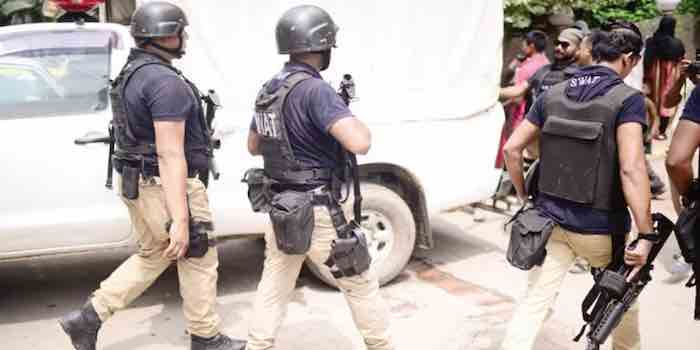By Salah Uddin Shoaib Choudhury ——Bio and Archives--November 15, 2023
World News | CFP Comments | Reader Friendly | Subscribe | Email Us

In the wake of increasing global concerns about terrorism and militancy, Bangladesh has been grappling with its own set of challenges. The country has been a battleground for various militant outfits aiming to destabilize the government and impose their extremist ideologies. In a previous article, we delved into the complexities of Bangladesh's fight against terrorism, focusing on the government's efforts and challenges in eradicating this menace. For a deeper understanding of the political landscape and the role of foreign influence in Bangladesh.
Although the people of Bangladesh rejected the Islamist-jihadist conglomerate of Bangladesh Nationalist Party (BNP) and Jamaat-e-Islami (JeI) and voted for a secularist Awami League in a landslide victory during the general election in December 2008, the task ahead was anything but easy. Prime Minister Sheikh Hasina and her government faced a Herculean task in checking the rise of militancy and terrorism. They also had to eliminate the existence of training camps and hideouts of anti-India separatist groups like United Liberation Front of Asom (ULFA). In addition, fighting jihadist outfits such as Jamaat-ul-Mujahideen (JMB), Harkat-ul-Jihad al-Islami (HuJI), and later the Ansarullah Bangla Team (ABT), which had formed an alliance with Al Qaeda in the Indian Subcontinent (AQIS), proved to be a formidable challenge.
These militant outfits had become increasingly audacious in their attempts to destabilize the law and order situation in Bangladesh. Their ulterior goal was to unseat Sheikh Hasina from power. Attacks targeting secularist individuals, journalists, bloggers, and even foreigners became almost a regular phenomenon. On February 26, 2015, husband and wife, Avijit Roy and Rafida Ahmed, both Bangladesh-born US citizens, were visiting Dhaka to attend a book fair when they were attacked by assailants wielding machetes. Roy was killed, and Ahmed survived but with critical injuries.
Two related groups claimed responsibility for these heinous acts. Ansarullah Bangla Team, an Al Qaeda-inspired terrorist group based in Bangladesh, was the first to claim responsibility. Shortly thereafter, Asim Umar, the now-deceased leader of AQIS, released a widely circulated video claiming that AQIS followers were behind the attack on Roy and Ahmed.
The situation in Bangladesh mirrors a broader global trend of rising extremism and militancy. For instance, Turkey has recently detained dozens of individuals suspected of having links to Kurdish militant groups following a suicide bomb attack in Ankara. Similarly, police in Turkey carried out raids across the country, detaining almost 1,000 people in a crackdown against suspected Kurdish militants.
The rise in global militancy poses a significant threat not only to individual countries but also to international peace and stability. Bangladesh, like many other nations, is at a critical juncture in its fight against terrorism and extremism. The government's efforts to curb this rising menace are commendable but fraught with challenges, as militant outfits continue to evolve in their tactics and reach. The international community must come together to support nations like Bangladesh in their fight against this global scourge.
Support Canada Free Press

According to a report by the United States Department of State, Bangladesh experienced a small increase in terrorist activity in 2019. ISIS claimed six IED attacks, five of which were directed at Bangladesh police. The Bangladesh government has been articulating a "zero tolerance" policy toward terrorism and has even hosted its inaugural National Countering violent extremism (CVE) Conference aimed at producing a national CVE strategy. However, ongoing deficits in Bangladesh’s judicial system contribute to a decade-long backlog of terrorism cases and a conviction rate estimated at less than 15 percent. This raises questions about the efficacy of Bangladesh's counter-terrorism measures and calls for more robust international cooperation.
For those interested in a deeper dive into Bangladesh's fight against terrorism, you can refer to our previous article on this subject.
Moreover, Bangladesh's struggle against extremism is emblematic of a larger, more insidious problem that transcends national borders. The rise of global terrorism has necessitated a unified international response, yet the onus disproportionately falls on countries like Bangladesh that serve as active battlegrounds. The government's counter-terrorism initiatives, such as Operation Thunderbolt in 2016, have been pivotal in neutralizing immediate threats, but the ideological battle rages on. The international community must recognize that Bangladesh's fight is not an isolated struggle; it's a microcosm of a global war against extremism that requires collective action and shared responsibility.
View Comments
Salah Uddin Shoaib Choudhury is an internationally acclaimed multi-award-winning anti-militancy journalist, writer, research-scholar, and Editor, Blitz, a newspaper publishing from Bangladesh since 2003. He regularly writes for local and international newspapers. Follow him on X @Salah_Shoaib
Editor & Publisher, Weekly Blitz weeklyblitz.net